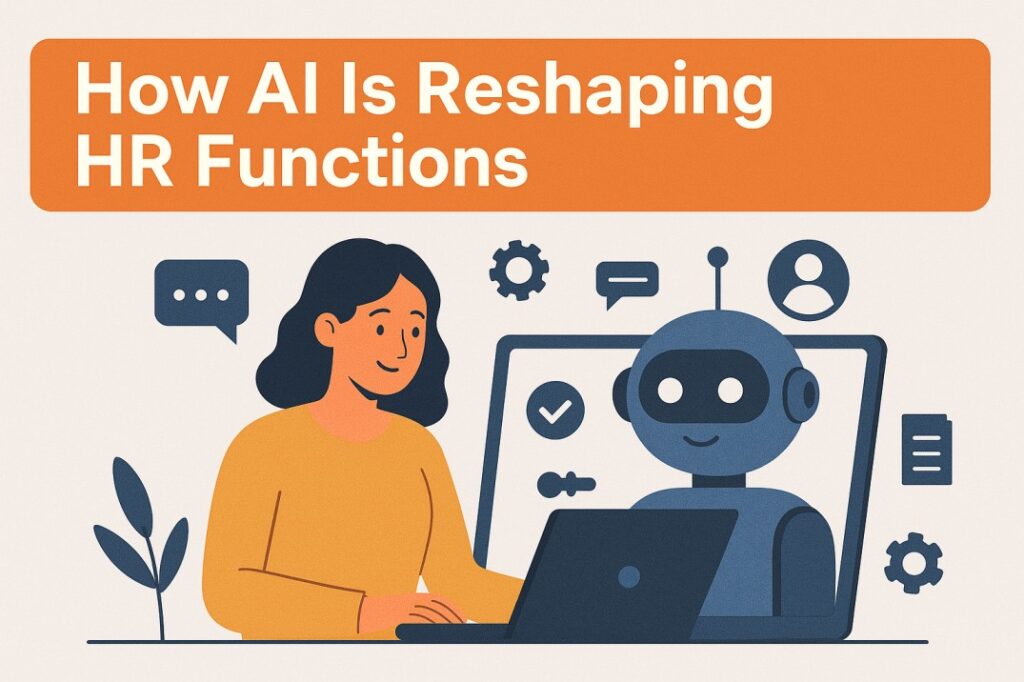Artificial Intelligence (AI) is no longer a futuristic concept—it’s here, and it’s transforming how Human Resources operates across the globe. From automating repetitive tasks to providing predictive insights, AI is reshaping every facet of HR, making it more strategic, data-driven, and human-focused than ever before.
In this blog, we explore how AI is revolutionizing HR functions, enhancing efficiency, improving employee experiences, and enabling better decision-making.
1. Talent Acquisition and Recruitment
AI is streamlining the hiring process through automation and intelligence:
- Resume Screening: AI-powered tools can scan thousands of resumes, filter qualified candidates, and rank them based on predefined criteria.
- Chatbots: Virtual assistants engage with candidates 24/7, answering queries and scheduling interviews.
- Predictive Hiring: AI analyzes historical data to predict which candidates are likely to succeed in a given role.
These innovations not only reduce hiring time but also improve the quality and fairness of the recruitment process.
2. Employee Onboarding
AI simplifies onboarding by automating document collection, training schedules, and FAQ responses. Smart onboarding platforms guide new hires through the process, ensuring consistency and better engagement from day one.
AI also enables personalized onboarding experiences by recommending resources tailored to each new employee’s role and background.
3. Performance Management
Gone are the days of annual reviews as the sole measure of performance. AI allows for:
- Continuous Feedback Systems: Real-time analytics track performance metrics, enabling frequent feedback and coaching.
- Bias Detection: AI tools help identify and mitigate unconscious bias in evaluations.
- Goal Alignment: AI ensures individual goals are aligned with team and company objectives using data-driven tracking.
This leads to more transparent, fair, and efficient performance evaluations.
4. Learning and Development (L&D)
AI is transforming corporate training into a personalized, dynamic experience:
- Skill Gap Analysis: AI assesses current competencies and suggests relevant learning paths.
- Content Recommendation Engines: Like Netflix for learning, AI suggests training materials based on employee interests and roles.
- Adaptive Learning Platforms: These adjust content difficulty and pace based on the learner’s progress.
AI ensures L&D programs are engaging, relevant, and effective.
5. Employee Engagement and Experience
AI tools help monitor employee sentiment through surveys, pulse feedback, and social listening.
- Sentiment Analysis: Natural Language Processing (NLP) identifies mood and morale trends in written communication.
- Engagement Bots: AI interacts with employees, collects feedback, and provides resources to boost well-being.
This allows HR to respond proactively to issues and improve workplace culture.
6. Workforce Planning and Analytics
AI empowers HR leaders with data-driven insights:
- Predictive Analytics: Anticipates turnover, absenteeism, and talent shortages.
- Scenario Planning: Helps HR model the impact of various business decisions on workforce needs.
- Data Visualization: Dashboards present HR metrics in a user-friendly format for strategic decision-making.
This enables better forecasting, budgeting, and strategic workforce planning.
7. Compliance and Risk Management
AI can monitor policy adherence and flag compliance risks in real time. For example:
- Automated Audit Trails: Maintain logs of HR transactions.
- Policy Violation Detection: AI systems identify anomalies and trigger alerts.
- Legal Updates: AI keeps HR informed of regulatory changes, reducing the risk of non-compliance.
This strengthens governance and reduces legal exposure.
8. Remote Work Management
As hybrid and remote work models persist, AI helps bridge the gap:
- Productivity Tools: Track progress and outputs without micromanaging.
- Virtual Assistants: Help remote employees with HR-related queries.
- Collaboration Analytics: AI assesses team dynamics and recommends improvements.
This fosters a connected, productive remote workforce.
The Human-AI Collaboration
Despite its growing presence, AI doesn’t replace HR professionals—it empowers them. AI handles routine tasks, freeing HR to focus on strategy, creativity, and empathy. The future of HR is a collaboration where technology amplifies the human touch.
Challenges and Considerations
Adopting AI in HR also comes with challenges:
- Data Privacy: Ensuring ethical use of employee data.
- Bias in Algorithms: Training data must be diverse to avoid reinforcing discrimination.
- Change Management: Upskilling HR teams to work effectively with AI tools.
Addressing these challenges with clear policies and responsible AI governance is crucial.
Conclusion
AI is revolutionizing HR, turning it into a more proactive, personalized, and data-driven function. From talent acquisition to employee engagement, AI enhances every stage of the employee lifecycle. Organizations that embrace AI strategically will not only streamline HR operations but also create a more fulfilling and inclusive workplace.

